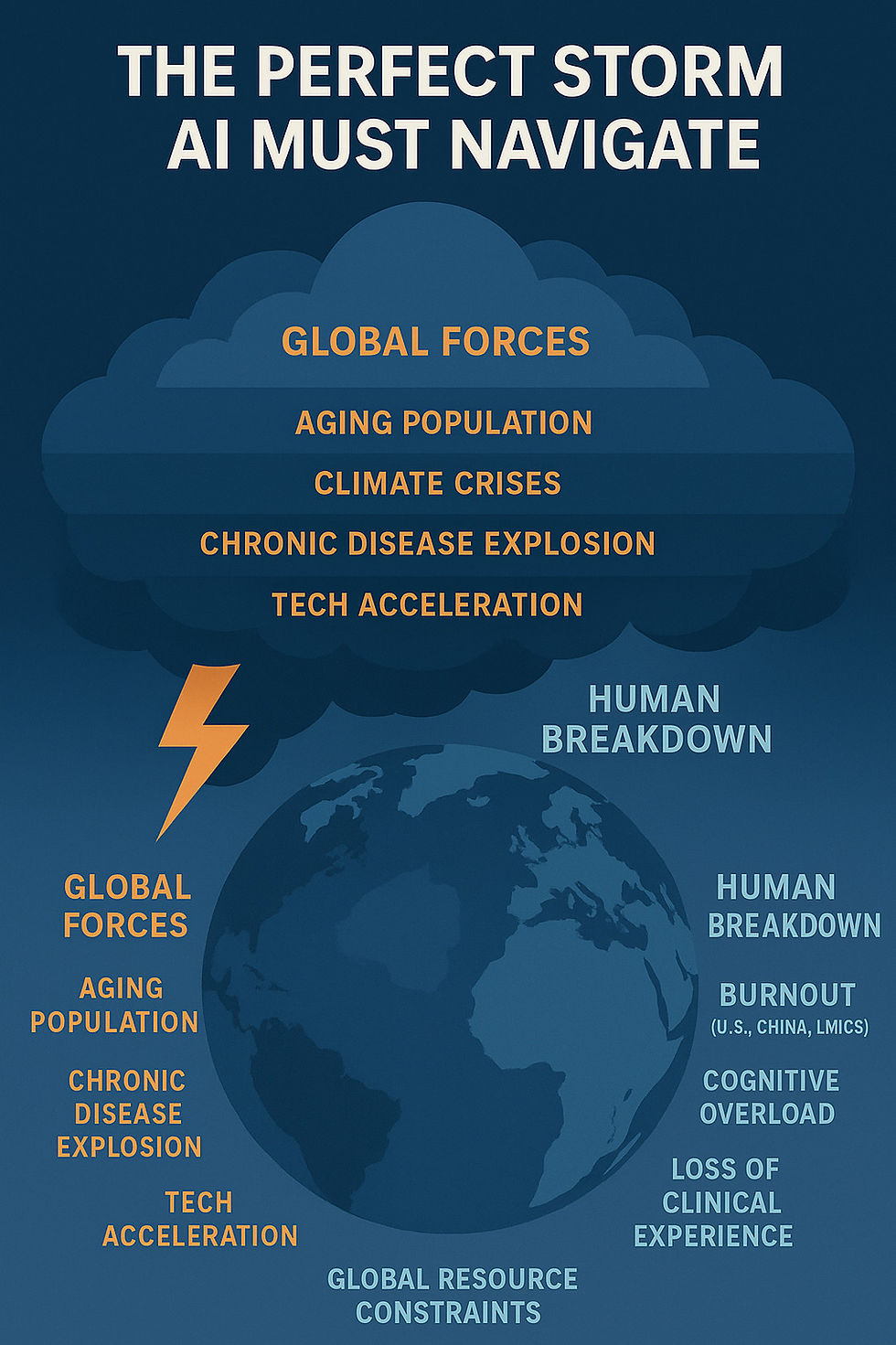From Overload to Augmentation: How AI Can Support the Clinical Workforce
- Eamonn McCormick
- Jul 24, 2025
- 4 min read
Eamonn McCormick
The healthcare industry is approaching a tipping point. Across hospitals, clinics, and health systems worldwide, clinicians are overwhelmed, not just by the growing complexity of care, but by the sheer volume of data, decisions, and administrative tasks they face daily. This blog explores how AI, used wisely and responsibly, can help shift the burden from overload to augmentation. By reinforcing clinical expertise rather than replacing it, AI co-pilots offer a practical path forward: one that strengthens the workforce, restores time for patients, and helps care teams adapt to an increasingly unsustainable environment.
The Perfect Storm Nobody’s Talking About
Healthcare is facing what I call a “perfect storm”, two massive forces colliding at exactly the wrong time:
Force #1: Everything is accelerating. Our population is aging faster than ever. Chronic diseases are exploding. Climate change is creating new health crises monthly. New treatments and technologies are flooding the market faster than we can absorb them. The pace of change isn’t just quickening, it’s becoming exponential.
Force #2: Our people are breaking. Physician burnout isn’t just a buzzword anymore, it’s a crisis. And it’s not limited to the U.S. In China, over two thirds of physicians report burnout, with rising incidents of sudden physician death linked to extreme overwork. In Lebanon, over 90% of physicians show moderate to high levels of burnout. Across low, and middle, income countries (LMICs), burnout rates among nurses, pharmacists, and community health workers are just as alarming. Even in Europe and North America, burnout ranges from 30% to over 50%, depending on specialty and care setting. This isn’t a local systems failure, it’s a global collapse of cognitive and emotional bandwidth in modern medicine.We can’t solve this by hiring more people or working longer hours. The human brain, however brilliant, has hit its processing limit in healthcare worldwide.

The Microsoft Moment for Healthcare
Remember when Microsoft introduced CoPilot? Suddenly, tasks that took hours now take minutes. Complex spreadsheets and presentations can be developed faster and with more rigor. Workers aren’t being replaced. Healthcare needs that same transformation. Not AI that replaces doctors, but AI that makes every healthcare worker feel like they have more capabilities to help patients. Imagine a cardiologist who can instantly analyze complex cardiac imaging while AI flags subtle patterns they might miss. Picture a primary care doctor whose AI assistant has already reviewed 200 pages of patient records and prepared a concise summary with suggested discussion points. Think about an oncologist who can access the latest research findings for a patient’s exact genetic profile in seconds, not hours.This isn’t science fiction. The technology exists today. We’re just not deploying it fast enough.
Where to Start: The High,Impact Zones
Not all AI applications are created equal. Based on conversations with healthcare leaders across the globe, four areas stand out as game, changers:1. Cardiology: AI systems that analyze cardiac data, predict risk events, and suggest personalized treatment pathways, giving clinicians additional pattern recognition capabilities 2. Diabetes Care: Virtual coaching systems that analyze glucose patterns, predict dangerous episodes, and provide personalized lifestyle recommendations, allowing one clinician to manage many patients meaningfully. .3. Oncology: AI that matches patient genomics to the latest credible, peer reviewed research, synthesizes clinical data, and suggests evidence, based options ,essentially a 24/7 research team for each patient. 4. Primary Care: Intelligent triage, automated risk assessments, and proactive patient outreach, AI that lightens the load on the front lines and keeps patients healthier longer.
The Uncomfortable Questions
Here’s what keeps me up at night: What happens if we don’t act fast enough?How many more doctors will burn out and leave medicine, in Africa, Asia, Latin America, as well as Boston, Beijing or Berlin?How many patients will receive suboptimal care, not because their providers aren’t trying, but because they’re being asked to do the impossible?How many medical errors will happen because clinicians around the world are operating beyond their cognitive and emotional limits? This is no longer just a U.S. or developed world problem. It’s a global capacity issue, and we must respond at scale.
Why "Wait and See" Isn’t an Option
I hear the objections: “AI isn’t perfect.” “We need more research.” “What about liability?” “Our staff isn’t ready.”These are all valid concerns. But they’re also excuses for inaction in the face of a crisis. The question isn’t whether AI is perfect, it’s whether AI, assisted healthcare is better than the alternative we’re heading toward. And that alternative is a healthcare system that simply cannot meet the needs of the population it serves.
The Path Forward (For Leaders Who Are Ready)
If you’re a healthcare leader reading this and nodding your head, here’s what you may consider to do: Step 1: Make AI a high priority item. Urgency matters. tart planning how to implement it strategically.Step 2: Pick your battleground. Choose one of the high, impact areas where AI can make an immediate difference in your organization.Step 3: Build executive support. This isn’t an IT project, it’s a fundamental transformation that requires leadership commitment and cultural change.Step 4: Start now. Not next quarter. Not next year. The organizations that move first will have a massive advantage.
The Bottom Line
Healthcare AI isn’t coming someday, it’s here now. The technology exists. The use cases are proven. The only question is whether your organization will be an early adopter that thrives or a laggard that struggles to catch up. We’re not just implementing new technology. We’re assisting an industry that’s critical to human health.
The question is: Do you want to get swept away by it, or do you want to harness its power? What do you think? Are you seeing these pressures in your healthcare organization? Share your thoughts in the comments below, I’d love to hear from front-line care teams and leaders about what you’re experiencing.


























Comments